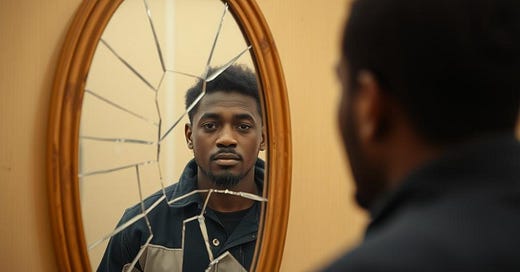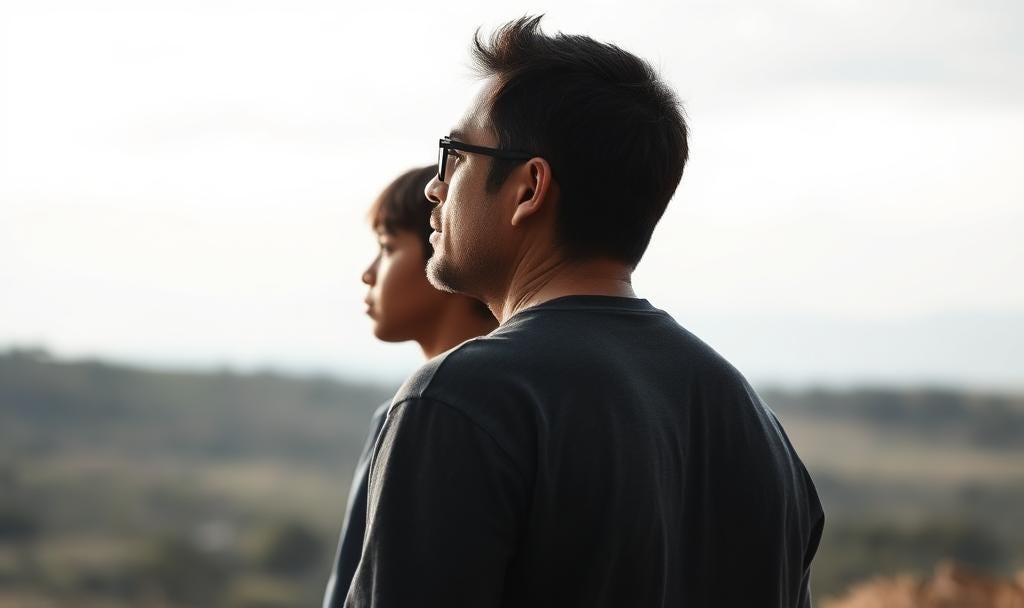The Broken Mirror
By Alex Holmes
I have sat on the precipice of an idea for half a decade. It's not a grand idea, not a tidy one either. It’s more of a slow-burning reckoning, threatening to unseat me the moment I give it language. It’s lived inside me for exactly as long as my book has been out. I know this because the two are connected, knotted at the root.
The idea is this: we need to talk about masculinity from a spiritual perspective.
From a Christian perspective. Not as a social script or a trending hashtag, but as a true spiritual condition. And we need to do it without flinching, without posture, and the tired reflex of cynicism.
This is my first attempt.
The very suggestion feels precarious.
I can already hear the imagined chorus:
“Why waste time on men and their feelings?”
“Let them die on their emotionally constipated hill.”
“Men are the problem…what more is there to say?”
At one point, I may have agreed.
I’ve sat in rooms where those sentiments rang loud, and I said nothing. I absorbed them. Internalised them.
I, too, began to look at men as a kind of affliction. An affliction that required management, not understanding.
I wanted them to feel the pain they had passed down. The pain they left behind in the women who raised us. The pain they left in me. I wanted them to feel it and not just conceptually, but viscerally. I wanted them to sit in it, to reckon with it, to bleed through it.
Then I grew up.
The position I held was that of a child. This temper tantrum spouting that we have to be something other than what we are, but the irony is, we don’t know who we are, and that is the problem.
What I inherited as masculinity was performance without explanation. It was duty without direction, identity without introspection. There were no instructions, just a tired refrain: this is what men do.
Apparently, what men do is grit their teeth, say little, and get on with it. And if you deviated, you were made to feel small. Soft. Suspect.
What men do is cause pain. This is what needs to be unpacked.
My time at university began to unravel that script. Like many young Black men searching for answers and girlfriends in equal measure, I found myself reading All About Love by bell hooks. But before love came rage, and before that, reckoning.
My first real encounter with hooks was We Real Cool: Black Men and Masculinity when I was twenty years old. I read it in the bathtub, the kind of intimacy you only afford to something or someone you trust to touch you deeply.
By the final chapter, I was in tears.
In that book, hooks exposes the social, historical, and emotional burdens Black men carry. She writes of masculinity as a trap. How it distorts self-worth, limits emotional expression, and ruptures relationships. She speaks of systemic racism, internalised shame, and the violence of expectation. It’s a book about us, written as if from inside us, but not by us. This bothered me slightly, for reasons I can’t quite get into in this essay - for now, rest in the idea that it just did something.
It cracked something open in me, but I didn’t yet have the language to name what was leaking out.
It led me to wonder: Is this just the Black male experience? Or are all men contending with the same silent grief, the same ache behind the mask? White men, Brown men, Asian men, Queer men? If this is universal, why aren’t more men talking about it? Why aren't more men writing about it?
Now, years later, I find myself writing more and more about men, not out of defence, but out of concern. I don’t write from a place of apology. I write from the corner of the room where men come in, bruised, exhausted, no longer able to perform, and I ask, “So, what did we learn?” I hand over a tissue.
I sit with them. I stay.
I wrote Time To Talk: How Men Think About Love, Belonging and Connection because I wanted to contribute to the conversation. It’s not what I wanted to write, but it is the book that came out of me.
It’s easy to be mistaken for a sympathiser when you write about men.
Even more so when you double down on the spiritual implications of men. (No, I won’t be writing on the mytho-poetic, Jungian archetypes. There is enough of that out there.)
I will be writing and exploring the Biblical implications and instructions around masculinity throughout. I will be navigating the heart of men and the holistic teachings that come from it.
I know, you don’t know how you feel about it. You think Christianity is dangerous, especially where men are involved. Any kind of organised religion.
I hope you will follow me. I hope you will challenge me. I hope you will ask questions. I hope you will engage, regardless of your thoughts and feelings.
We are not enemies here.
To be lumped in with red pill ideologues and masculine influencers trading vulnerability for influence. That’s not me. I hold myself accountable, and am accountable to God.
I expect to be held accountable. I hold other men accountable. I challenge. I encourage. I observe. I listen. I contribute. I also know when to be silent. But through it all, I’ve come to understand something with increasing clarity: most men, across race, age, and class, are deeply uncomfortable in their own skin.
This discomfort is not anecdotal. It is structural. It is spiritual.
In 2024, I worked as a school counsellor with boys aged eleven to sixteen. That experience reoriented me. It shaped me in ways I can’t fully articulate (…though I’d place it only a few rungs beneath my walk with Jesus). It brought me closer to the core of the crisis.
What I learned in the wake of that experience, and the years of writing, teaching, and listening, is this:
They told us to be men, but they never told us what that means.
If you were lucky, you had a male figure to model it for you. If you were even luckier, that figure offered guidance beyond gender norms. But most of us? We were cobbling it together from fragments: films, fathers, failures. We were guessing.
What we saw in the mirror was often confusing.
And now, the mirror itself is cracked, distorted by algorithms, capitalist masculinity, and endless performance. It no longer reflects us. It sells to us. It mocks us. It demands of us.
We’ve created a culture where masculinity is both too rigid and too porous. Too brutal and too apologetic. And boys, who are still learning how to exist at all, are made to feel ashamed simply for being boys.
In my role, I was often pulled into rooms to speak with boys labelled “difficult,” “challenging,” or “possibly ADHD.” Often, what they needed wasn’t discipline. It was recognition.
When spoken to as human beings, they spoke back.
They told me they missed their dads.
That their mums were tired.
They travelled for hours each day because their local schools had failed.
They said they were nervous around girls, so they acted up to cover it.
They hated being called weird or creepy, but they didn’t know how else to be seen.
They are not bad people. They are children.
They are not broken. They are forming.
And we are failing them.
Masculinity, as it stands, is not fit for purpose. It is everywhere and yet nowhere. Loud but hollow. Glorified in hashtags and algorithmic rage, but spiritually bankrupt. The traditional model is struggling to revive itself and has been called outdated. The new one? Still under construction. And in the absence of meaningful rites, honest role models, or inner work, boys are growing into men with no blueprints - only echoes.
And this, my friends, is where the danger lies.
I have more views. But wider than that, I have questions.
As a writer and a mental health professional, I feel called to follow those questions, wherever they lead. This essay is the beginning of that exploration.
I want to examine masculinity not as a set of traits, but as a condition of being. I want to explore how we relate to ourselves, to one another, and through the lens of faith. I want to sit in the silences, not just the statistics.
This iteration of my writing is my attempt to do that.
If you’re willing to come with me, the mirror might not be fully mended.
But we might just begin to see something clearer.
This isn’t about being “better men.”
It’s about becoming whole humans.
And it starts now.
– Alex






I recall Dr. Naim Akbar, noted Black Psychologist at Florida State University speak at a Third Eye Conference in Dallas TX, early 1990's. He wrestled with what he entitled, "the Spiritual and Ethical Legacy of Ramses II." What rings in memory is his point..." ancient Egyptians believed more in what they could not see, than what they could see!" Spirit. Spirit undoubtedly shaped the wonders that still befuddle generations later as we marvel at their works. After listening to this lecture more than several times, I remember connecting to a greatness within that has shaped my walk, not only as a man, but as a whole person.
Look forward to seeing more on this! I’m not Christian but over the last few years have encountered a few authors from various branches of Christianity who I’ve really resonated with specifically because of the universal truths present in the way they talk about spirituality, and even more so when it is pointing us towards being a whole, sovereign being!